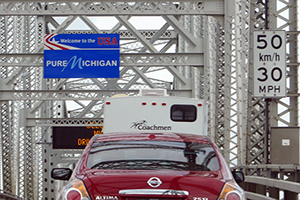Michigan Senate Considering Bills to Allow Toll Roads

LANSING, Mich. — State senators are considering legislation that would allow toll roads in Michigan as part of a broader package to provide for public-private partnerships and other alternative financing methods for infrastructure projects.
Joseph Pavona, a special adviser to Gov. Rick Snyder, told the Free Press on Dec. 9 that the most immediate uses he sees for Senate Bill 627, dubbed the Michigan Alternative Project Delivery Act, are projects to improve the freeway pumping stations around Detroit, which have failed frequently and caused flooding, and to build a long-discussed intermodal transportation center in Detroit.
As for toll roads in Michigan, "currently, right now, there is nothing under consideration," Pavona said after testifying before the Senate Commerce Committee on Dec. 9.
But it’s the toll road piece that is sparking strong opposition in some quarters.
James C. Walker, representing the Wisconsin-based National Motorists Legislation, told the committee the legislation "would allow tolls or user fees on new facilities and on existing roads that were merely repaired, with no legislative oversight.
"The toll rates would have no legislative controls on amounts or their increases."
A companion bill, Senate Bill 628, would allow the state to collect from and penalize motorists who pass automated toll stations without paying their tolls. Both bills are sponsored by Sen. Mike Kowall (R-White Lake Township).
Kowall said the legislation is "intended to provide expanded tools for state and local authorities and other public entities to acquire infrastructure ... under a range of funding and finance mechanisms" that provide greater flexibility.
The committee chairman, Sen. Wayne Schmidt (R-Traverse City), heard testimony from three witnesses Dec. 9 but did not put the bills up for a vote.
Pavona testified that 33 states have passed legislation to provide for alternative delivery of infrastructure projects such as public-private partnerships, and such a method is being used in Michigan on a recent project to improve freeway lighting around Detroit.
Though Michigan now has the authority to take on such projects on a case-by-case basis, private investors who would finance such projects are looking to states that have signaled their support by passing comprehensive enabling legislation, Pavona said.
"It's that message that we send to the market," he said.
Corey Boock, a California attorney who has advised Michigan and other state governments on private-public partnerships, said having legislation in place can provide greater cost certainty, accelerate projects and transfer risk to the private sector. It also can improve the ability to raise upfront capital and lead to projects with longer life spans because the private sector has a stake in long-term performance.

